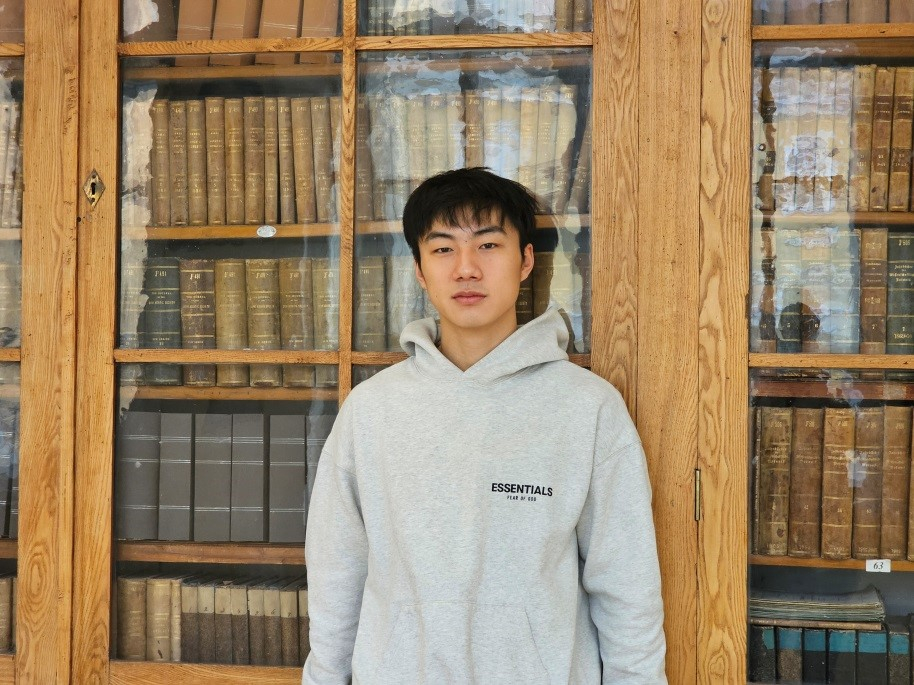Break the pattern: from undergraduate school to preparatory department
Xie Bolin, a 23-year-old student from Changchun in northern China, recently graduated from the Journalism Faculty at St Petersburg University and is now taking a year-long Russian language course at our Preparatory Department. In this interview, he shared his experience of studying at the University, overcoming language barriers, and adapting to Russian culture.

How did you decide to study in Russia and at St Petersburg University?
Back in school, I never even had a thought of staying in China for university. Instead, I was actively learning Russian — we had Russian lessons available. I didn’t just want to go anywhere in Russia, I wanted to go to St Petersburg specifically. I really love this city. I also decided on St Petersburg University early on. When I first arrived, I was a bit stressed while adjusting to a new environment and language difficulties, but as my level of Russian improved, I fell in love with life here. Summers in St Petersburg are especially beautiful, with plenty of parks and vast stretches of water. For example, I love spending time in the 300th Anniversary Park in St Petersburg and have visited there almost every day this summer.
Why did you choose International Journalism?
SPbU International Journalism bachelor’s programme.
In school, I was really into basketball and wanted to build my life around it. But since I didn’t grow up tall enough, I shifted my focus to journalism, aiming to become a sports journalist and stay in the industry that way. I enrolled in the Russian-language programme, since my English was noticeably weaker than my Russian and it was really tough at first — I hardly understood anything in class. However, full immersion in the language environment paid off very quickly, and my language skills improved in no time at all. My dissertation still caused me a lot of trouble. Deep down, I’m still a basketball player, and doing academic research felt a bit alien to me, especially in a foreign language. My topic was "The difference between Russian and Chinese media". I graduated fine, though.
As well as studying, international students have to deal with a lot of everyday challenges — what was the most difficult for you?
When you first arrive in a country, everything feels unfamiliar — both in daily life and in terms of language and administrative tasks. For example, I had a huge issue with registration. When I rented an apartment for the first time, the landlord didn’t want to help with the paperwork. By the way, I never lived in a dorm — I’ve always rented apartments. I find flats on platforms like Avito (Авито) and Cian (Циан), and it can take anywhere from a month to three months to find one, because Russian landlords reluctantly deal with the hassle of registering a foreigner. You just have to be prepared for that.
I enrolled on a self-funded basis, which is quite costly — I can’t remember the exact figure. The main thing is that my parents value my education very highly and they didn’t mind the cost. Apart from the tuition fees, I spend about 50,000 roubles a month on living expenses. It’s worth noting that prices have risen significantly in the last four years, and living in a big city will always a bit more expensive anyway. I am really counting on a scholarship for a master’s degree.
Tell us about studying at the Preparatory Department?
Since I already had a good level of Russian, I was placed in an advanced group — there are only 5-6 of us. Now I’m really concentrating on learning the language to absolute fluency.
Explore SPbU Preparatory Department specialisation tracks.
I don’t know why, but many students have lived here for years and still don’t speak Russian. Maybe they rely on their strong English, but among my friends there are quite a few who haven’t made much progress after several years and aren’t particularly interested in learning the language.
What are your plans after finishing the Preparatory Department?
I’ll probably go back to the Journalism Faculty for a master’s degree or apply for a philology programme. First and foremost, I want to become a translator. While studying here, I realised how much I’m interested in the Russian language, so I want to build my career in that direction. Maybe at the intersection of journalism and translation.
What do you love most about Russian culture?
The food! Borscht and shawarma! But overall, I find Russian culture very interesting, and the longer I live here and the more Russian friends I make, the closer and more familiar it feels to me.
Would you recommend studying at St Petersburg University?
Look, I’m living in a beautiful city, studying at a prestigious university, learning an interesting language — honestly, I don’t see any downsides.

